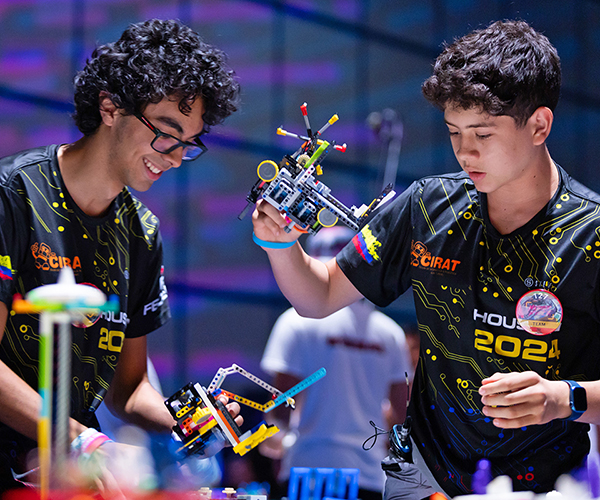Andy Miller had some trouble doing his chores.
They got done, but his parents had to be very specific in their instructions. “If he had to take out the trash, we reminded him to tie the [bag’s] top, take it to the trash can, put the bag in the can, and wheel it out to the end of the driveway,” says his mom, Dee Dee of Russell Township.
They got done, but his parents had to be very specific in their instructions. “If he had to take out the trash, we reminded him to tie the [bag’s] top, take it to the trash can, put the bag in the can, and wheel it out to the end of the driveway,” says his mom, Dee Dee of Russell Township.
So when Andy, now 12, wanted to attend his first overnight camp a few years ago, Miller was a little wary. She wasn’t exactly sure her older boys, Matt, now 15, who had trouble keeping track of his stuff, and Will, now 17, who ran a tight ship, were ready to handle the responsibilities of life away from home either.
In the end, she relented. After all, they all did well at weeklong day camps for swimming and soccer. So they perused brochures and she let each choose his own camp.
Matt picked Earth Arts Camp at the Cuyahoga Valley National Recreation Center. Andy chose the Red Barn Camp, and outdoor sports camp in Kirtland. Will went to Camp Roosevelt for Boys, a traditional summer camp in Perry.
In the end, their choices worked out. Though Will found he didn’t like the rigid timetables of his traditional camp, each boy reinvented himself to varying degrees, talking to girls and meeting new friends outside of school.
But as a parent, how can you be sure the time is right for your child? “If the child has shown some social skills in dealing with peers, age-appropriate behavior with friends, and is able to respect and respond to authority figures,” then they’re probably ready to go to sleep-away camp, says Caren Nowak, a licensed social worker in individual, family and marital counseling.
Experiencing sleepovers at friends’ or grandparents’ houses, showing the independence to dress themselves, picking out their own clothes, making their own bed and having previously gone to a day camp all aid children in a smooth transition to overnight camp. A decent sense of time provides a good indicator, too. “They must understand that two days is more than two ‘Sesame Streets,’ ” says Dave Devey, owner/director of Falcon Camp and American Camping Association board member.
Maturity, more than age, gives an accurate sign of camp readiness. “Some kids are ready at 7, others not until they’re 9 or 10,” says Jerry Duffie, executive director of 4-H Ohio and president of ACA Ohio. “Even older children get separation anxiety.”
So begin with small steps: a three-day day camp then a weeklong day camp.
“If the child is old enough to go to preschool, they’re ready for day camp,” suggests Dr. Ethan Schafer, psychologist and ACA adviser.
From there, parents should rely on their instincts. After all, they know their child better than anyone else. If parents still aren’t sure their child is ready to attend overnight camp, they may consult others that have an objective relationship with the child, such as teachers or pediatricians. “A child may be immature at home, but behave well in a structured environment like school,” says Nowak.
But these are guidelines, not rules. Andy, despite his less than stellar management of household chores, adapted easily to camp, Miller says. The opposite held true for Will. But “their desire to try something new, something they couldn’t do at school or didn’t do with the family, drove them to try camp,” she says, such as hip-hop dance or entomology.
On the flip side, there are many clues that a child is perhaps not ready for overnight camp. Signs of anxiety, such as stomach problems, headaches, clammy hands and butterflies, indicate the child may not be ready for an extended stay away from home. Past behavior can predict camp behavior, as well. A timid child or a bully will most likely continue those characteristics at camp.
Anxiety should not be confused with anticipation. Most kids worry a bit before attending camp for the first time. To ease these tensions, it’s important to address specific issues. Is the child worried about getting teased? Making friends with other campers? Being physically able to perform in competitive activities? “Don’t ignore these specific issues by simply saying, ‘You’ll be fine’ or ‘You’re going, and that’s it,’ ” says Carin Cunningham, assistant professor of pediatrics at Case Western Reserve University School of Medicine. Those phrases are far too general.
Parents can unintentionally plant fears in their child. Ask the child exactly what they’re concerned about and offer coping mechanisms. “Don’t ask questions like, ‘Who are you going to sit next to at lunch?’ The child may not even have been thinking about that, and you’ve just added another factor to think about,” says Nowak. Sitting down with your child and discussing what to expect at camp helps alleviate these fears.
It’s normal to be nervous before going to camp, Schafer says, and parents should normalize that experience. “Tie the child to previous successes and focus on positive experiences and activities,” he says. “Remind them of all the fun they’ll have at camp.” For the Millers, it was the boys’ day-camp experiences at Hawken Sports Camp and Camp Invention.
Making the effort to include children in the process of choosing a camp and preparing for departure also reduces anxiety.
“Involve the child in buying camping clothes, equipment and packing for the trip,” says Cunningham. “Prepare preaddressed envelopes for sending letters home and show your child you’re doing the same thing.”
When it finally comes time to drop him off at camp, don’t make a fuss. Wave goodbye and head home. Schafer advises parents to model confidence: “If a parent shows nonverbal signs of apprehension, it makes the child nervous.”
But within hours of a parent’s departure, a child may call and beg to return home. He misses you. He’s homesick.
“Almost everyone gets homesick,” says Schafer. “The vast majority of the time, it abates after 48 hours.” A phone call home may cause some parents to panic, but don’t promise to rescue the child.
“Kids aren’t dumb,” says Devey. “They know which buttons to push. Sometimes a message home is just an indirect way of asking, ‘Do you miss me’ or ‘Are you having too much fun without me?’ ”
Reassure the child, says Cunningham. Parents should give it at least a week before considering pulling the kid from camp, and then only if normal functions such as eating and sleeping aren’t being managed, adds Schafer.
Devey tries to turn homesickness into a positive. “I tell children, ‘It’s wonderful that you miss your parents,’ ” he says. “We talk them through it, and sometimes let them cry it out a bit. It’s a growing experience.”
Camp counselors are trained to deal with situations such as this. Counselors give special attention to these campers, taking extra care to watch them during the typical homesickness-inducing periods, such as meals and bedtime, and make every attempt to keep them busy.
“It’s hard to be miserable when you’re constantly doing something, especially if it’s fun,” Schafer points out. He can recall only one time when a child just couldn’t stick it out.
Overcoming homesickness can empower children, too. “If rescued too quickly, they’ll never work it out themselves. Kids feel efficacy and power if they wait it out and adjust,” says Cunningham. The challenge of homesickness can help children realize their potential, says Schafer, like overcoming the isolation felt when living in a new, faraway place for the first time.
Miller decided to bring Will home after a couple weeks at Roosevelt Camp when he pleaded with her. “He didn’t have a major freak-out, but camp was just not a plus for him.” He’d done sleepovers before without an issue, and he found he prefers to come home at night. “He’s a poet, musician and an athlete, and because he’s more improvisational with his creative outlets, he likes to do them at his own pace,” adds Miller.
But parents are often surprised by how well their children adjust to camp life. “The boys were more ready for camp than I thought they were,” Miller says. With the average age parents send their child to camp rising, Schafer notes, “it blows a parent’s mind that a young kid can go to camp and not only survive, but thrive.”
These aren’t the only benefits of the camping experience. Hundreds of little things happen every day that help improve self-worth and self-esteem, says Schafer. “Campers are exposed to people from all different walks of life they’ve never met, participate in many different activities and live and get along with kids they’ve never seen.”
Camp offers many opportunities for children. Where else can you live with peers and be independent from mom and dad for an extended period before college? Children bring home new, unexpected experiences.
“Andy came back and said, ‘You’ll never believe what I got: poison ivy!’ ” laughs Miller. “He was so darned excited about it!”
It also provided an outlet for the boys to reinvent themselves. “The five of us spend a lot of time together, but camp gave each boy his independent time,” says Miller. “And all of us enjoy our own time.”



